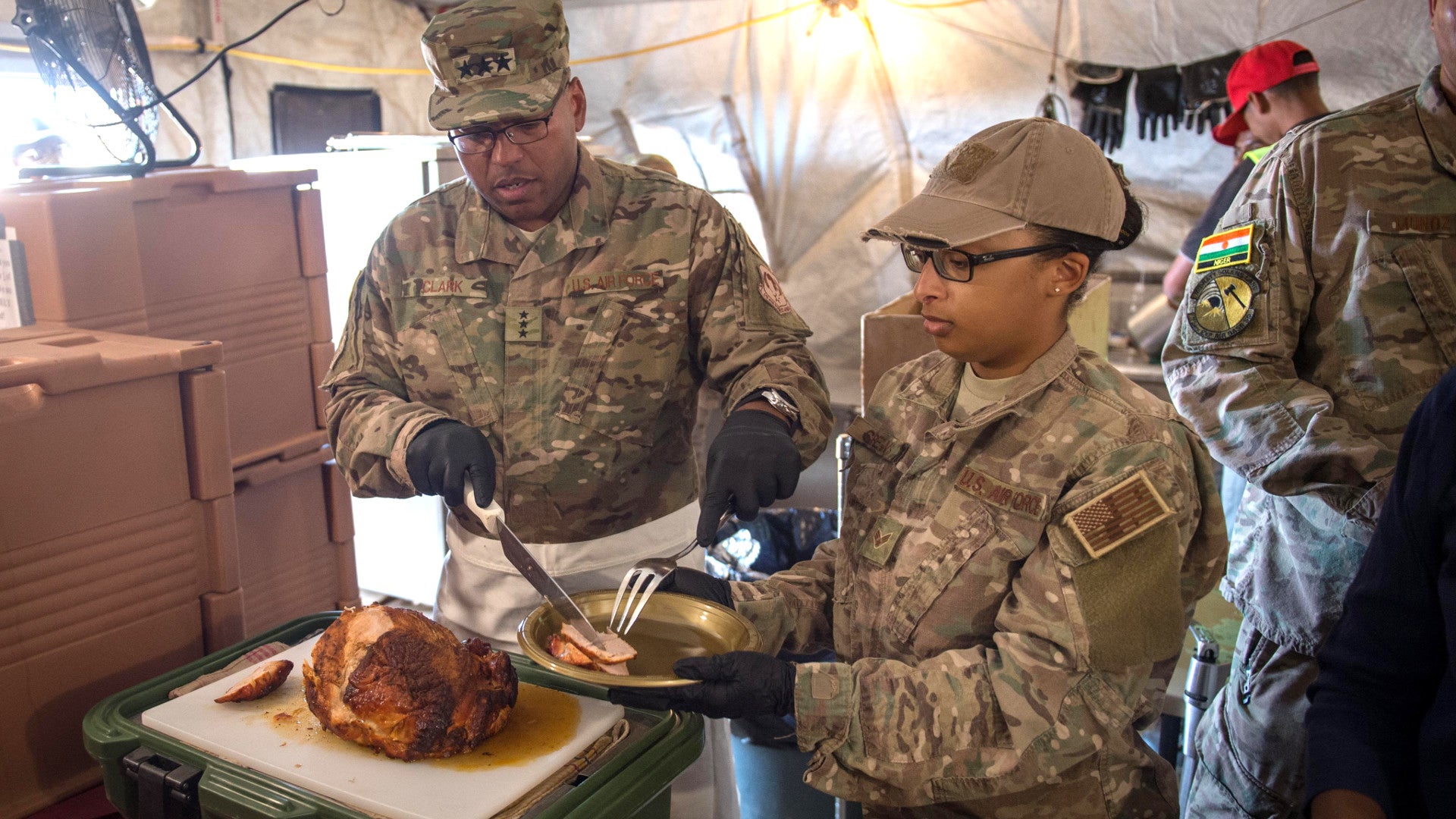A deadly ambush in Niger that resulted in the deaths of four American troops in October 2017 continues to fuel debate about whether American personnel there have adequate resources to perform their mission. One thing is clear, no matter how austere their bases might be, U.S. forces in the West African country will be celebrating the Thanksgiving Holiday as they would on almost any other deployment.
In an Email to The War Zone, Samantha Reho, a spokesperson for U.S. Africa Command, confirmed that mess halls within the U.S. military facilities in the Nigerien capital Niamey and the more centrally located city of Agadez would serve a special Thanksgiving menu. It is unclear whether personnel at any of the half dozen other sites that host American forces in Niger would have similar options. At the time of writing, the U.S. Air Force had not responded to a separate request for similar information.
“In any deployed environment across the globe, the respective Services section assigned to the location make holidays, like Thanksgiving, as special as they can to build morale and provide a bit of comfort from home,” Reho explained. “Additionally, U.S. troops have the option of participating in a Turkey Trot 5K and other recreational games during the day.”
These services do not necessarily reflect the growing size and scope of U.S. military operations in Niger. American troops enjoyed the same comforts in 2016, with U.S. Air Force Lieutenant General Richard Clark, the commander of the 17th Expeditionary Air Force, even helping serve Thanksgiving meals in Agadz during a stopover as part of a larger tour of various bases in Africa and Europe.

Every year, the Defense Logistics Agency makes sure to distribute massive amounts of appropriate food items to American forces around the world. In 2015, DLA said it had shipped out nearly 34,800 pounds of turkey, 21,450 pounds of ham, and more than 9,000 pounds of stuffing mix, among other things, to help U.S. military units celebrate the holiday.
At present, the United States has approximately 800 troops in the country, a little over 500 of them being members of the Air Force as of September 2017, according to official Pentagon statistics. That service’s 409th Air Expeditionary Group, and its subordinate units, oversees the bulk of day-to-day operations in both Niamey and Agadez.
But U.S. personnel are probably grateful for an additional respite during their deployment to Niger, which has many of them in remote and potentially dangerous areas. This is particularly true for troops in Agadez, situated in the desert scrub of the Sahel, the transitional strip of the African continent that separates the Sahara and North Africa from the true sub-Saharan regions.
Though attached to facilities associated with the Nigerien Air Force’s Base Aerienne 201, which shares Manu Dayak International Airport’s single runway, the American camp is remote and looks foreboding. In September 2017, the U.S. Air Force released a timelapse video shot from inside a Humvee conducting a routine patrol around the site’s perimeter, which you can see below.

Throughout most of the clip, the only light is from the truck’s headlights or those of other passing vehicles. Even in the main camp, there is little illumination.
This offers a window into the challenges Staff Sergeant Brady Little and other personnel faces when trying to determine whether or not a speeding convoy of vehicles heading toward the base in April 2016 was hostile or just lost. The Air Force only publicly revealed this potential terrorist attack, which thankfully ended without incident, had occurred earlier in November 2017.
In addition, Air Force Security Forces teams at the site have limited enough resources that they were apparently more than happy to enlist the help of members of the U.S. Army’s 411th Military Police Company, even if only temporarily, in September 2017. The soldiers were in Agadez as part of a separate training mission, but helped guard the camp before heading home to Fort Hood, Texas.
Beyond that, there are simply a lot of environment challenges, “be it the 40 mile an hour winds that we’re kind of suffering through now, the 110 degree heat, or just the crushing rain that we get, which almost is worse that it is helpful,” U.S. Air Force Colonel John Meiter, head of the 724th Expeditionary Air Base Squadron in Agadez, explained in an official video interview in April 2017. “Everything is much harder here.

This marked the official first year anniversary of an American military presence in the city. Since at least 2015, however, the United States has been working to build a new, larger facility in Agadez to support expanded operations. Notably, the base will eventually host unmanned aerial vehicles to fly surveillance missions over Libya, Mali, and other hotspots in the region.
This work was supposed to be done by the end of 2017. Unfortunately, the weather and the difficulty of getting building materials and supplies to the site have pushed that date back until sometime in 2018. In the meantime, U.S. Air Force drones continue to fly from the American base in Niamey.
American personnel at the base will probably enjoy having a taste of home with the special meal, but the weather might make the Turkey Trot less of a “fun” run.
A huge thanks from The War Zone to all our men and women in uniform serving away from home this Thanksgiving.
Contact the author: joe@thedrive.com
